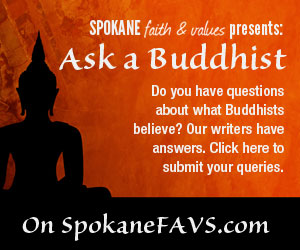Sarah Conover has been a Buddhist practitioner for nearly three decades. She's ready to answer your questions about the faith. What do you want to ask a Buddhist?
Q. Is finding a guru necessary? Or in this day and age — more connected, chaotic and providing access to knowledge from throughout the globe in one tiny piece of technology — is self study possible? What do you recommend, either way?
A. As one of my teachers, the Venerable Ayya Tathaaloka says: some answers are questions themselves. I interviewed a number of teachers and students from various Buddhist traditions to get a bearing on this issue.
Because the Buddha was a teacher and the Dharma is the body of his teachings, simply to study Buddhism means you already have a teacher. Yet, as mentioned above, your query leads to more questions than answers, the most important being, what do you want from a teacher? Some people come to Buddhism to reduce stress: some come hoping for a lot more. You asked if a teacher were “necessary,” but first, you must explore what you hope to gain from studying and practicing the teachings of the Buddha. As you point out, study from books and the internet is rather effortless; becoming a practitioner may prove another matter.
The word guru is the Sanskrit word for teacher, but is often freighted with connotations of blind reverence. The role of the teacher changes according to each Buddhist tradition or blend of traditions. For some, it can convey the state of being awakened (enlightened or liberated), involve giving transmissions of esoteric teachings, teaching lineage rituals, or confirming attainments. For others, a teacher’s role may be to give inspirational talks and lifestyle suggestions, teach meditation techniques, or model compassion and attunement.
So, we’re back to how might you, dear reader, benefit from a teacher. Yes, there are incredible resources on the Internet such as Dharmaseed.org, AccesstoInsight.org or Tricycle Magazine, listing hundreds of teachers and dozens of audio recordings and transcriptions from those teachers. Yes, since the Dharma is supposed to be free (according to the Buddha’s teachings), both the ancient canonical works and many interpretations of those texts from modern teachers are available free online. Yet, and this is a big yet, a living teacher with whom you have a personal relationship can provide an authentic example of commitment, dedication and practice of a path, as well as make visible a variety of behaviors that model integrity and reflection, internally and externally.
The Buddha organized the sangha, the Buddhist community, as a group of spiritual friends, knowing that we need support for our practice. He considered himself to be your very best spiritual friend. That’s not a bad definition for a teacher. It’s more difficult to go it alone, to keep the discipline not only for precepts (in the case of monastics), but the discipline necessary for daily meditation. Most of us have a good sense of how challenging it can be to stay focused on the heart of life rather than its ordinary preoccupations and distractions (aka samsara: our worldly activities based on all that is ephemeral).
Buddhism supports inquiry into one’s own life and so will require one to work independently. Self-study is a part of the work, but not all of it. One of a teacher’s duties is to point out distortions in our thinking that we may not be able to see ourselves. In a totally independent study through technology and books, these blind spots may not be seen or known. It is not a requirement that everyone work with a teacher, but the opportunity exists and can really enhance and accelerate practice.
If you are working with a teacher, it is important to remember that very likely, the teacher hasn’t eliminated all of his or her personal challenges; however, a teacher should face these interpersonal, moral, and spiritual questions in an honest and courageous way. The teacher doesn’t have to be elevated above us: in Buddhism we are looking more along the lines of wisdom and a modeling of experience that can be useful for our own growth.
Take your time and be careful when choosing a teacher. We’ve all heard disturbing stories in which both student and teacher blur the boundary between respect and reverence. The Dalai Lama recommends that you not only ascertain if a teacher’s knowledge of the Dharma is authentic and deep, but also that you really take a good look at the community of students around him or her before deciding to join it. Another well-known teacher said that you should choose your teacher as carefully as you choose your spouse (actually, she said more carefully — but she’s an unmarried monastic and I’m definitely not). A student should expect a teacher to be able to explain the process of how they work with students and the value of what they are doing.
A teacher should be a guide, someone who facilitates our own inquiry, not an authority that overrides it: to do so would be to contradict the Buddha’s basic premise that one must “put no head higher than your own” in terms of learning the Dharma. You’re not looking to a teacher for the answers; you’re looking to a teacher for the questions.
Special thanks to Larry Heliker, Dan Nussbaum, Linda Modaro, Mary Webster, Ven. Thubten Chodron, Ven. Thubten Semkye, and Ven. Thubten Chonyi for exploring this question with me.
Sarah Conover has been a Buddhist practitioner for nearly three decades. She's ready to answer your questions about the faith. What do you want to ask a Buddhist?









